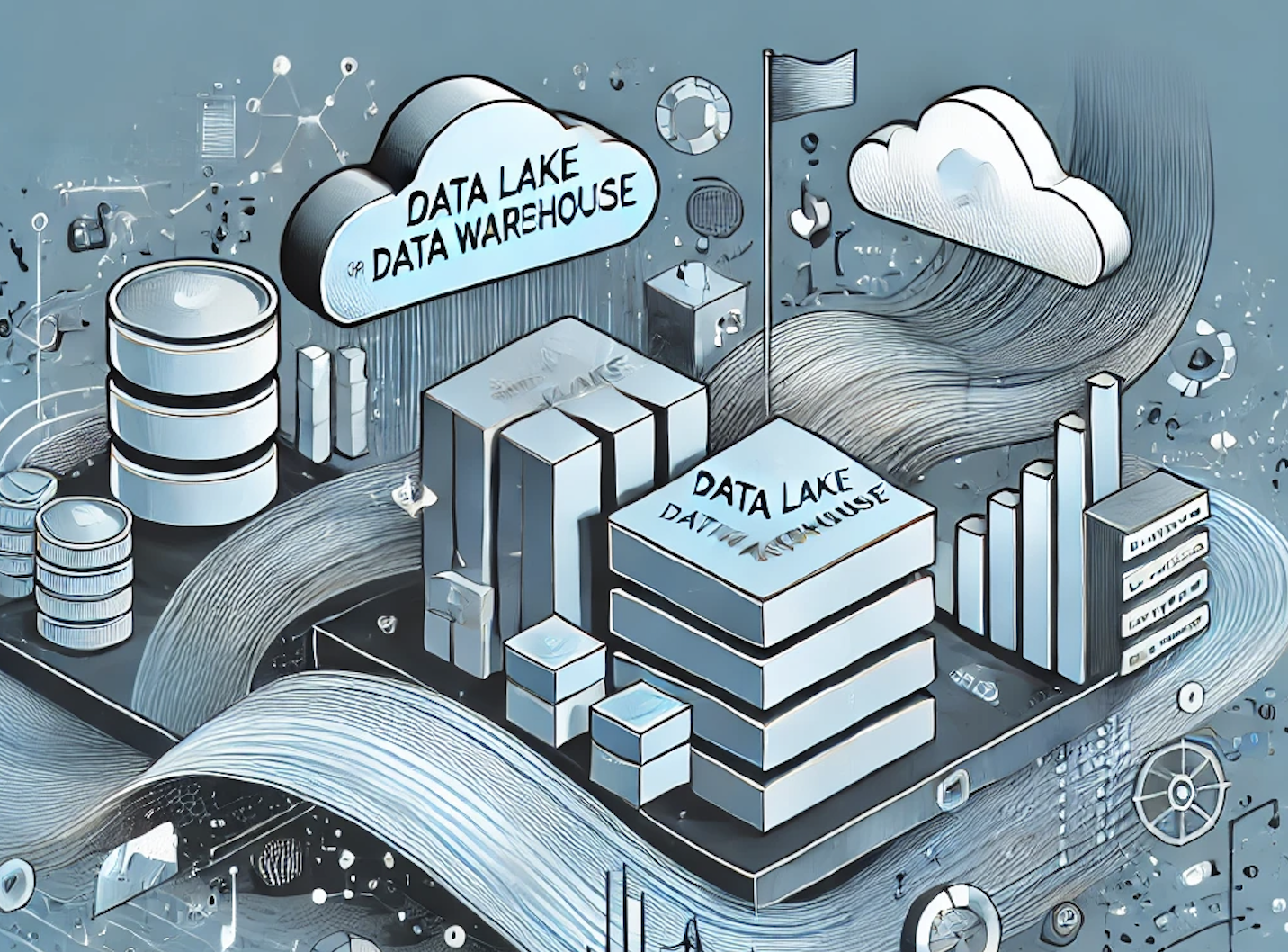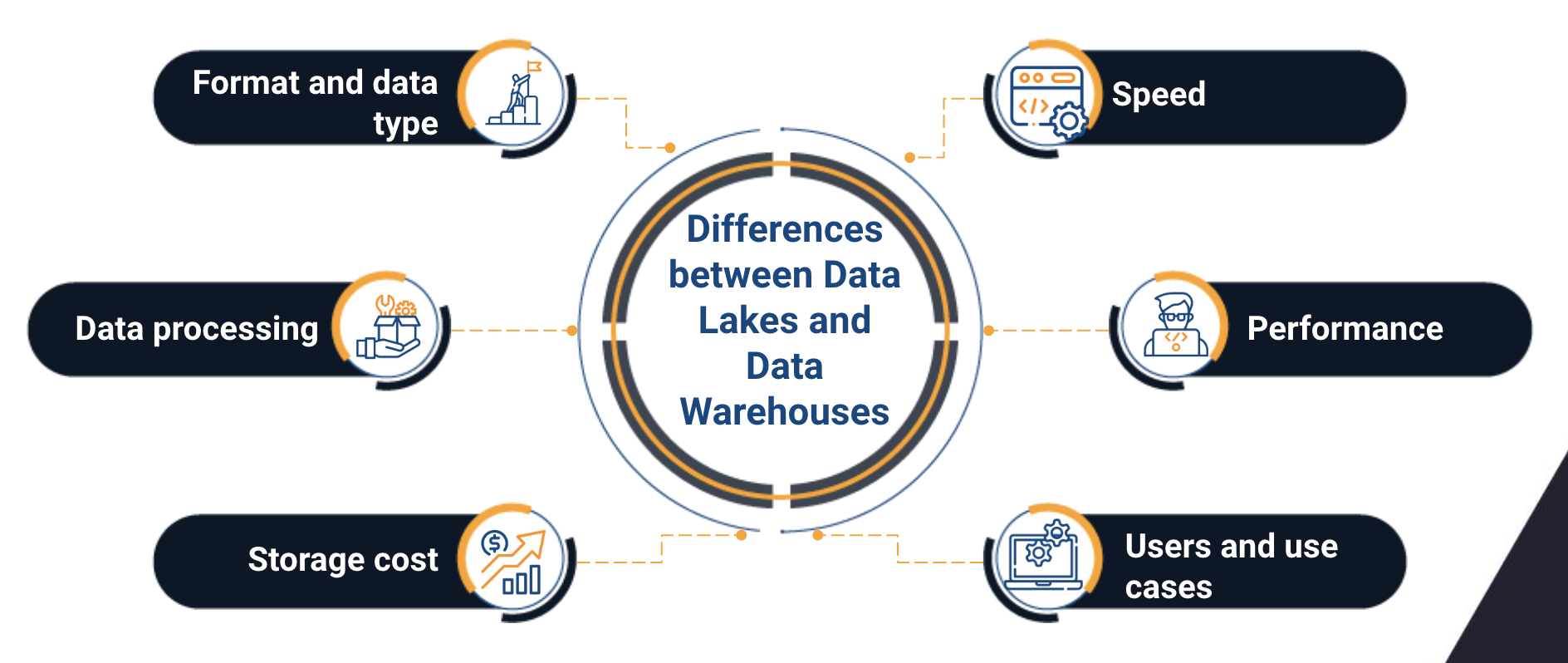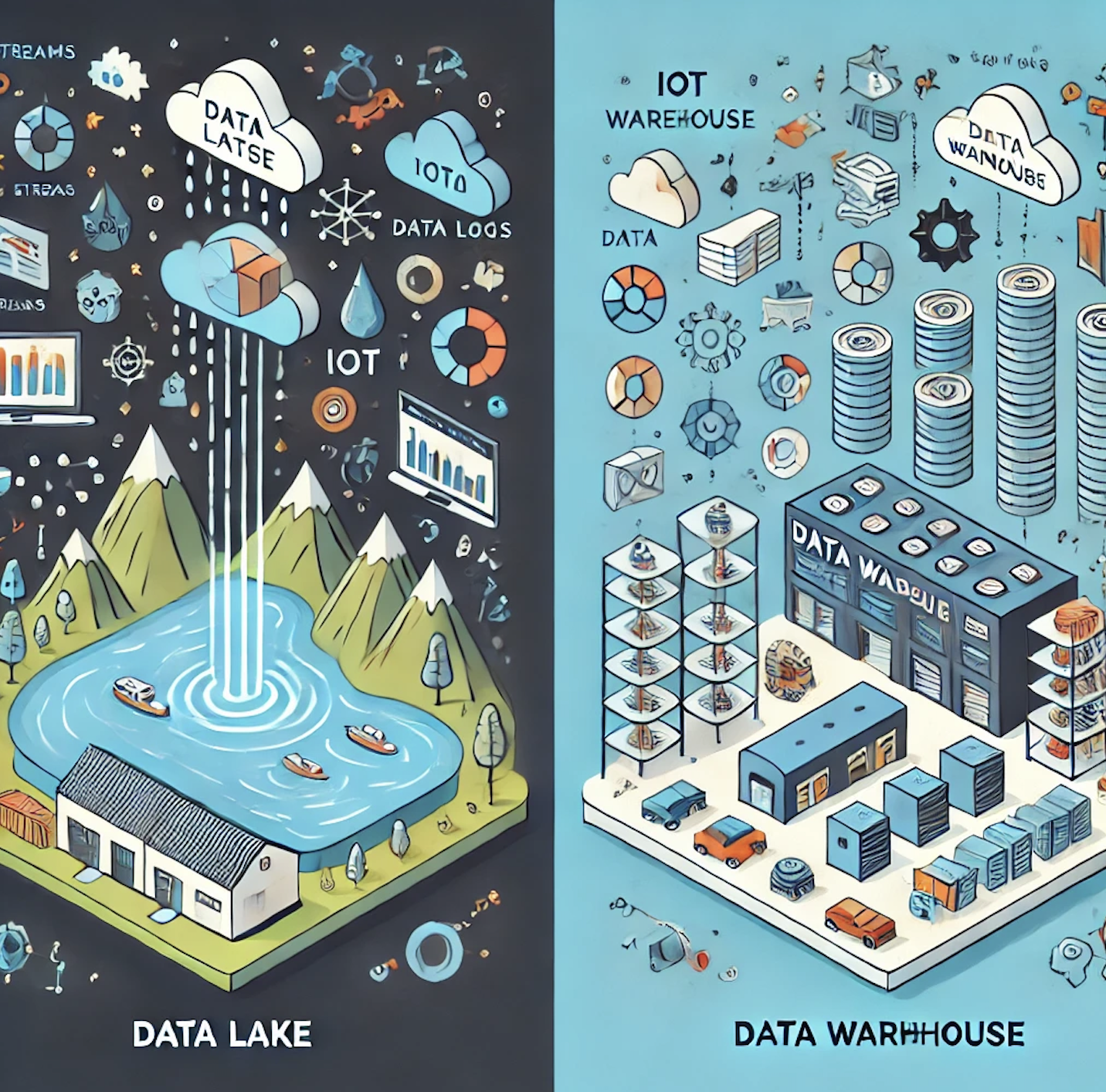
Data lakes vs. data warehouses: Differences
September 26, 2024
Table of contents
Quick Access

In an increasingly data-driven business environment, companies face critical decisions about how to manage and store large volumes of information. Two of the most commonly used architectures for data management are data lakes and data warehouses. Although they are often mentioned together, these solutions have significant differences that make them suitable for different business needs.
When choosing between a data lake and a data warehouse, business leaders, managers, and CEOs need to understand what each offers and how they align with their strategic goals. In this article, we will discuss the key features of each solution, their benefits, and when one should be considered over the other.
What is a Data Lake?
A data lake is a centralized repository that allows large volumes of data to be stored in its original format, without the need for structuring or pre-processing. The main advantage of a data lake is that it can house raw data, both structured and unstructured, making it ideal for companies that handle different types of information, such as video files, images, texts, and sensor data.
Data lakes are usually built using cloud storage and offer scalability and flexibility, allowing data to be analyzed later according to the needs of the company.
What is a Data Warehouse?
A data warehouse is a system designed to store structured, organized, and optimized data for analysis and reporting. Unlike a data lake, in a data warehouse the data is processed and transformed before being stored, meaning it is ready to be used in quick analysis and reporting.
Data warehouses are primarily used in environments where users require fast and efficient access to structured data for operational decision making, such as sales, finance, or marketing analysis.
Key Differences Between Data Lakes and Data Warehouses
1. Data Format and Type
One of the most notable differences between a data lake and a data warehouse is the nature of the data they store. Data lakes can contain raw data, allowing for the storage of unstructured, semi-structured, and structured information. This includes everything from documents, logs, multimedia files, to sensor data.
On the other hand, data warehouses are specifically designed to store structured data, such as that coming from relational databases. This data is transformed and organized before entering the system, making it easier to generate immediate reports and analysis.
2. Data Processing
In a data lake, data is stored in its original form and processed at the time it is needed for a specific analysis or project. This offers flexibility, as it allows analysts to perform different types of analysis in the future without having previously defined the structures.
In contrast, in a data warehouse, data is processed and structured before being stored. This pre-configured approach ensures that users have access to processed and organized data ready for quick queries, making it ideal for business analytics where accuracy and efficiency are crucial.

3. Storage Cost
Another major difference is the cost of storage. Since data lakes store data in its native form, their infrastructure is typically cheaper, especially when it comes to storing large volumes of unstructured information. However, costs can increase when additional tools are required to process and analyze that raw data.
In contrast, data warehouses tend to be more expensive due to the need to structure the data and their optimized design for reporting. Also, since they are primarily used for structured data, the amount of storage is lower, but the cost per storage unit can be higher.
4. Speed and Performance
When it comes to performance, data warehouses have a clear advantage when you need to quickly access large sets of structured data. The optimization that is done during the storage process ensures that the data is ready to be queried, reducing response time and improving analysis efficiency.
In contrast, data lakes offer greater flexibility, but processing raw data can slow down query and analysis times. This is because the data is not pre-structured, so users must process it in real time, which can be slower.
5. Users and use cases
The type of users that interact with a data lake and data warehouse also varies. Data lakes are primarily used by data scientists and advanced analytics teams that require access to large volumes of raw data to perform exploratory or experimental analysis. These professionals have the skills to process and structure the data as needed.
On the other hand, data warehouses are designed for business users who need quick and easy access to structured data, such as sales, marketing, or finance teams. Data warehouses provide a user-friendly interface that facilitates reporting and data-driven decision making.

When to choose a Data Lake?
A data lake is a suitable choice if your company:
- Handles a wide variety of data types, including unstructured files.
- Has a team of data scientists or analysts who need to perform complex analysis.
- Wants to store large volumes of data at a lower cost.
- Prefers a flexible and scalable solution that allows for future analysis without the need to preprocess the data.
When to choose a Data Warehouse?
A data warehouse is the right choice if your company:
- Focuses on structured data and needs fast and efficient reporting.
- Requires immediate access to accurate information for business decision making.
- Relies on organized historical data for specific analysis, such as sales or finance.
- Has users who need an intuitive interface to access and analyze data without a lot of processing.
Combining the two: Data Lakehouse
In recent years, a hybrid approach known as a data lakehouse has emerged, which combines the best of both worlds. A data lakehouse allows you to store data in its native format like a data lake, but also organizes and optimizes it for analysis, like a data warehouse. This option is ideal for companies looking for flexibility without compromising performance.
The choice between a data lake and a data warehouse depends on the specific needs of your business. If your company handles diverse data and seeks flexibility for future analysis, a data lake may be the right choice. However, if your priority is fast access to structured data for reporting and business decision making, a data warehouse will be more effective.
The possibility of adopting a data lakehouse solution can offer the best of both worlds for companies that need a balanced approach in terms of flexibility and performance.
We recommend you this video
Related Blogs

Why are digital signatures secure?

How can I create a digital signature?

How do digital signatures work?

Differences between digital signature and electronic signature

Clone of Why implement a process management solution?
.jpg)
